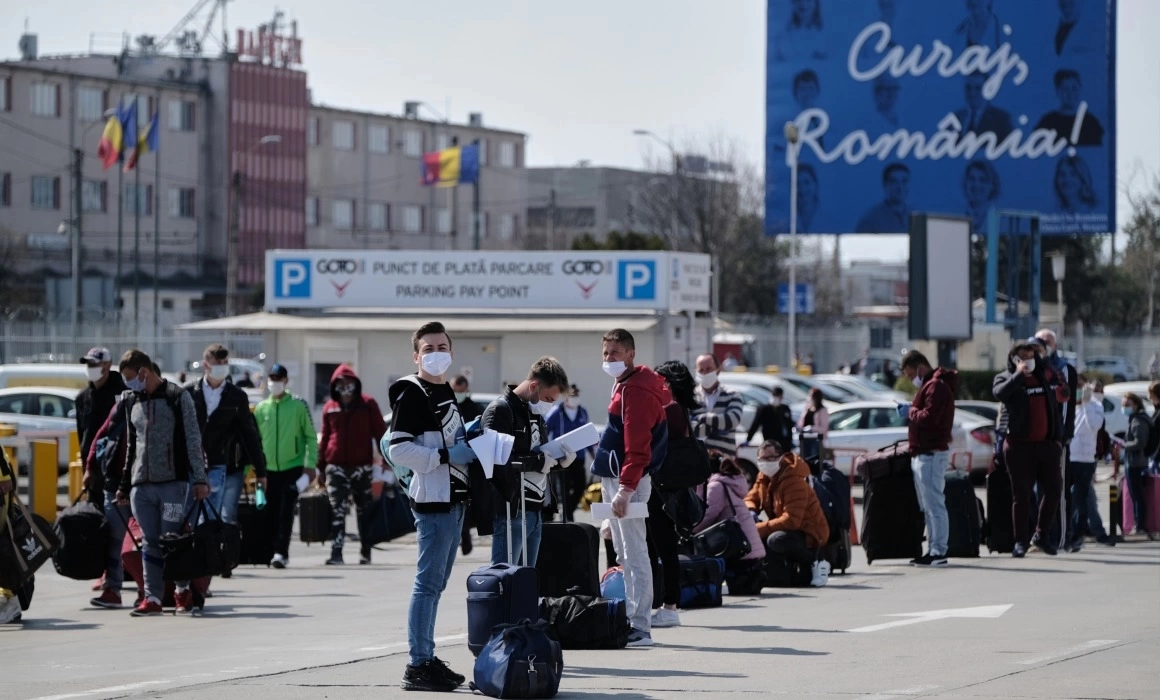Even without the risks of Coronavirus, a recent UK study shows that agricultural workers are among the most vulnerable to exploitation, abuse and sometimes even modern slavery. It also points out that Romanians and Bulgarians are the most vulnerable to these risks in Europe. "The pandemic is going to create a heightened environment for exploitation and slavery to take place," says Paul Coffey, a representative of the UK's labor inspectorate, Gangmasters and Labour Abuse Authority, whose farm checks have been hampered in recent months by strict quarantine rules. In the midst of the Covid pandemic, I spoke to British workers, activists and authorities to better understand the real price of summer fruit and the cheap Eastern European labour that brings it to our plates in the UK.
Under pressure
In early April, farmers and major national food producers in the UK and Germany persuaded their governments to approve special flights to transport Romanian seasonal workers, who have been harvesting crops in richer western European countries for more than a decade. Although Romania was still under a state of emergency and strict quarantine regulations, more than 16,000 seasonal workers left the country in April alone.
Around 90,000 seasonal workers are needed in the UK each year, UK agriculture experts estimate. Although they were declared unskilled immigrants during Brexit, Britain needed special planes loaded with Romanian workers to pick their fruit and vegetables during the pandemic. In order to fill the gap left by workers unable to travel due to quarantine in Eastern European countries, the UK launched campaigns like "Pick for Britain" and "Feed the Nation", designed to encourage British citizens to sign up for agricultural work. To motivate Britons, the campaigns use patriotism and allusions to World War II, a favourite chapter in British history. Even Prince Charles has weighed in with a clip filmed in an idyllic spot in Scotland, encouraging his compatriots to pick up work in agriculture. The vast majority of comments urged Charles to get to work first.
Despite all these recruitment efforts, and despite the pandemic sending many into unemployment, the British don't seem to be flocking to farming jobs. In 2018, out of 10,000 applicants to Concordia, the UK's largest farming agency, only 2 were British. In April 2020, the agency reports that 36,000 British citizens applied, out of which 16% agreed to be interviewed online; 900 got the job and 112 accepted their contracts.
Ion*, 39, is from Băile Herculane and has been working as a seasonal worker for 9-10 months a year since 2011, picking strawberries on the same farm in Herefordshire, England. Although the Romanian authorities have promised to better monitor the transport of seasonal workers during the pandemic, Ion tells me over the phone that on the 6th May, when he flew on a charter plane from Otopeni airport, there were no empty seats between passengers, even though there were many rows of empty seats in the back of the plane. The man doesn't believe there is a virus spreading in the world: "It's worldwide political propaganda." He says they were not given disinfectant, gloves and a mask on board, as promised by the authorities. Instead, they were offered water and a sandwich, for which he wondered at the time if he would have to pay.
"Once the workers arrive in the UK, we are dealing with a black hole because nobody knows exactly what is happening on the farms."
Bev Clarkson, Unite national officer
Once at the farm, he found out he'd have to pay £100 for his plane ticket. He was also finally given a temperature check at the farm, something that had not happened at airports in Romania or England. He was asked to quarantine for 7 days, instead of the 14 required by government recommendations, before starting the actual work. He picks strawberries eight hours a day, but is disappointed he doesn't get the chance to pick more. For shopping, they are allowed to go to shops in the small town near the farm and are advised to stay away from other people. Bosses are urging workers not to gather in the evenings at the same "caravan" and socialize, as they risk spreading the virus. But, says Ion, who’s going to listen to them.
At the start of the pandemic, the British government issued guidance to farmers to prevent the spread of the virus. Bev Clarkson, national officer of Unite, one of Britain's largest trade unions, is pressing the government to find out whether flights bringing in seasonal workers really do follow social isolation rules, whether incoming workers are tested, whether they quarantine upon arrival, whether they live in conditions that allow social isolation if needed. "Once the workers arrive in the UK, we are dealing with a black hole because nobody knows exactly what is happening on the farms," Clarkson says.
Vlad* is 27, from near Craiova, and on 22 May, he traveled from Bucharest to a farm near Cambridge, where he has been picking soft fruit (strawberries, raspberries) every season since 2015. He says the rules of social distancing were respected on the plane, and newcomers to the farm are encouraged to stay away from each other. However, the recommended quarantine period was not observed on Vlad's farm either, and work began as soon as he arrived. In Parliament, Lord Gardiner Kimble of the House of Lords announced that seasonal workers must be quarantined for 14 days, but the period can be shortened if the flow of supplies from the UK is at risk. In addition, since June, seasonal workers are officially exempt from any quarantine when they arrive in the UK. Vlad says he manages to finish a 4kg crate of strawberries in 4 minutes maximum, for which they are paid around £1.05 - £1.20. He's in the top five fastest pickers on the farm; money motivates him, but also, the competition itself: "I do it for the competition, to be as good as possible." He says he's become so productive thanks to his experience, "I've done it for six years. And it's nice to compete 😂😂". I ask him what he thinks about while picking: "Us fast people, we focus on picking. Weaker people don't compete and talk with one another more."
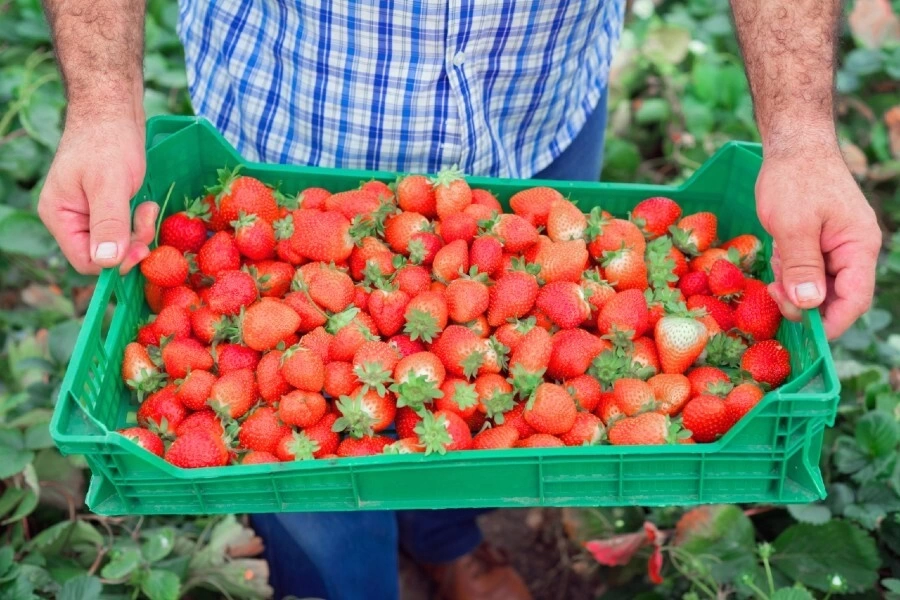
First-time farmers have a harder time adjusting to working conditions. For example, the pressure intensifies alongside the strawberry season, when workers are asked to be increasingly productive. If pickers fail to meet a certain standard by noon, they are sent back to their caravans that day as punishment. Florina Tudose of the Eastern European Resource Centre is trying to find out from lawyers whether such practices are legal. Farmers' demands have also become more rigorous because quarantine rules in eastern European countries have relaxed: Britain now has access to labour and farmers can replace workers much more quickly.
Such pressures were also popular at the soft fruit farm in Chichester, England, where Adrian Mareș worked as assistant manager and then harvest manager. If seasonal workers failed to meet their shift by lunchtime, they were sent home for the day and given a warning. After six warnings, they risked dismissal. Therefore, an unwritten rule was that those who harvested more by noon gave the less industrious crates for a fee. "Under pressure. I've had cases of depression and that kind of stuff," Adrian continues.
On most UK farms, workers are paid for the amount they pick. Alexandru Barbacaru, a recruitment agent for Est-Vest Service, which brings labour to the UK, says the practice could be seen as unfair. Although some highly productive people - who he calls "combines" - make up to £1,000 a week, he also works with people with lower yields: "A farmer called me, I've been sending him people to pick daffodils for ten years. He said: Alex, I've had 10,000 workers come through and I've never seen anything like it, this man picks 10 poppies in an hour... You give the man another chance, a transfer, but you also fire him, because that's the way this world works." Many of the Romanians I spoke to are happy to be paid for the amount of fruit they pick, because in Romania they would be paid about 100 lei a day (about £18.50) for a day of work, an amount they can earn on a farm in England in two hours at most.
Regarding the work conditions on farms, many of the people I spoke to were satisfied. Iulia Racolța worked for five years on a soft fruit farm in Kent and says she was happy with their farm. There were four people living in a caravan, where "there was someone to do the cleaning, it was heaven." Adrian Mareș, a former harvest manager in Chichester, confirms. "The worker gets bedding, crockery, fresh bedding, transport to the shop, transport from the airport, parties. If we talk about work, yes, work is hard. But people have a choice." Giulianela Calina, a former supervisor at a soft fruit and apple farm in West Peckham, recounts episodes of all kinds: "There was a lot of fun, a lot of laughs. There were also days when it rained a lot and we picked in rubber boots. Some girls would pee blood... their feet would get cold and they'd get a urinary tract infection." The main problem, Giulia explains to me, was working extremely long hours at the height of the season. Sometimes the work started at 4 in the morning and ended at 8-9 in the evening, with breaks to sleep under the shade of trees when it was too hot. If it got dark, the workers would use the headlights of the cars to see what they were harvesting. Giulia says it suited them to stay so long overtime because they made a lot of money, even £300 a day. For these reasons, they were willing to lie when checks came to the farm. Giulia would translate the inspectors' questions to the workers: "They are asking you how many hours you work a day, answer eight or ten." She also learned Bulgarian on the farm and instructed the Bulgarians what to answer. As a supervisor, she would log shorter hours for her workers in the official register.
"The Romanians are coming to save us"
In 2014, it became easier for Bulgarians and Romanians to work in Western Europe, which prompted the UK's shock media to herald an invasion of Eastern European immigrants. The Daily Mail tabloid wrote on the last day of 2013 that buses and flights full of Romanians were heading to the UK and that some tickets cost as much as £3,000, figures and speculation that turned out to be untrue. Perhaps the most vocal pro-Brexit political campaigner, politician Nigel Farage has built his entire political strategy on anti-immigrant rhetoric, predicting how Romanians will steal British jobs and take advantage of welfare benefits.
But, since the pandemic, The Sun and The Daily Mail, publications known for their sensationalist portrayal of Eastern European immigrants - often associating them with poverty, gangs and crime - have dropped the offense. Romanians are now called brave Romanians, critical workers in articles with headlines like Romanians to the Rescue. Florina Tudose of the UK's East European Resource Centre confirms that the media discourse has made a 180 degree turn. "But it's going to change right back after all this madness is over, because migrant workers have been the scapegoats for this country's problems for years. We've seen an increase in hate crimes with the referendum, but after the pandemic, when a major economic crisis follows, I expect an even bigger wave of hate against Eastern European immigrants," Florina continues.
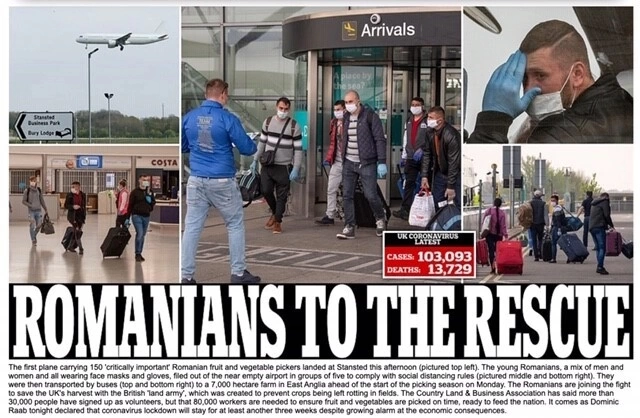
Although the press called the British lazy for not taking jobs in agriculture during the pandemic, there were also some British voices in the papers reporting that they had signed up to work in agriculture and were not recruited. Harry Pyrgos, 26 years, tells me that all the farms he applied to told him they were waiting to see if their regular Eastern European workforce would be able to travel. This summer, Harry was planning to work at festivals, setting up stages and working the bar. Since all the festivals have been canceled, he hoped to work in agriculture, as he still wants to spend the summer outdoors. He’s got experience: last year he worked on an olive farm in Portugal. Moreover, the public call for British laborers made him emotional, he wishes he could do something useful now that the world is in the air. Harry has a caravan he could live in on the farm. He tells me that on forums for caravan enthusiasts, other people who haven't found farming work in the UK explain that farmers prefer to use Eastern European workers not only because of their experience, but also because they have to live on the farm and therefore pay the rent charged by farmers, around £50 a week.
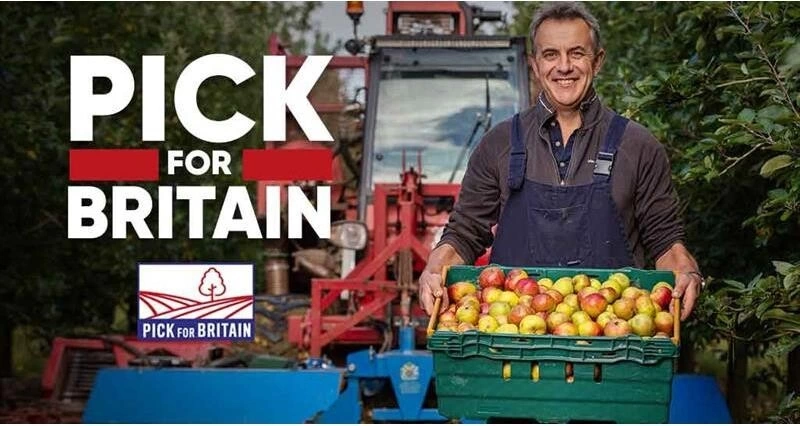
"[A campaign to encourage farm work] can't be successful with locals because they are disconnected from reality," believes Alexandru Barbacaru, director of recruitment agency Est-Vest. "So, the story is beautiful, to help the country like in World War II. But I think that out of a hundred locals who start work, if two remain by the end of the week, it's a big deal," he tells me. "Organizations I work with have confirmed it. It's work below what they [the Brits] think is worthy of a man." In the three years Adrian Mareș has worked as a harvest manager on a large farm in Chichester, he has dealt with only one English worker, sent by the Labour Office, who lasted a week on the farm. "The English don't work on farms anymore. The stronger the roots of the worker in the host country, the more they move to better-paid sectors that require less physical effort," explains Adrian. "Poles now work in factories. Romanians are still on farms," he continues.
"The English are not cut out for it. The Romanian struggles, the Romanian has to finish construction for the house at home."
Giulianela Calina, former fruit farm supervisor in the UK
Iulia Racolța and her husband worked for five years on a farm in Kent: "There were no English people, only sometimes one English worker at a time. What the Englishman was picking in a day, we were picking in an hour or two. They're not used to it and they don't like the low class work, they think of it as low class work." Ion, who has worked on the same Hertfordshire farm since 2011, agrees: they can't stand it, they don't like it, I don't know... They didn't even last when we were paid per hour.' Vlad, who has been picking strawberries near Cambridge since 2015, has 20 English colleagues for the first time this year. But the English don't pick strawberries, they're in charge of fruit maintenance (cleaning strawberries of dried fruit, etc.) "Picking is very hard and they're not used to working fast," says Vlad.
"Romanians know they’re not going to stick around for longer than 3-6 months, so they work their butts off," explains former harvest manager Adrian Mareș. Former farm supervisor in West Peckham, Giulianela Calina, believes that "the English are not cut out for it. The Romanian struggles, the Romanian has to finish construction for the house at home." "As far as I'm concerned, they should work my ass off, because that's why I left the country. But I don't know, they're stopping us," says Ion, who works 6-9 months a year as a farmer in the UK.
Even though farmers are among those most in need of Eastern European labour, many of them voted for Brexit. Vicki Hird, from the UK farming alliance Sustain, teaches me an English saying: "Turkey votes for Christmas." In the Romanian version, the turkey would be replaced by the pig.
The current situation and the lack of a consistent agricultural workforce raises questions about what will happen after Brexit, when the migration of Romanians will be made more difficult. Although there is talk in the UK of a seasonal visa scheme for 10,000 workers from 2021, farmers are worried they will need even more labour from abroad. Ali Capper, a farmer and one of the leaders of the National Farmers' Union of Great Britain (NFU) does not expect major changes in agriculture, because seasonal work is temporary and very difficult, and the UK was turning to labour from Eastern Europe even when the unemployment rate was as high as 8-10% (in 2013).
Most at risk of exploitation
Besides the fact that Romanian workers pay rent to farmers, work "their butts off" and tend to return year after year, Eastern Europeans don’t really complain about working conditions. "Romanian workers don't ask for their rights, nor do they know what rights they have here. They are vulnerable. First of all, many don't speak English so how can they ask for their rights?" explains Florina Tudose from the East European Resource Center in the UK. Ion, for example, says he has never read his contract, even though he has been working on the same farm for nine years.
To check that farms are following the rules of good conduct, Alexandru Barbacaru, director of Est-vest services, visits farms where he places workers every two years. In case of complaints, the agencies basically investigate internally, look for solutions and, if necessary, move the worker to another farm.
"Romanian workers don't ask for their rights, they don't even know what rights they have here."
Florina Tudose, Eastern European Resource Centre in the UK
In the UK, all agricultural employers must obtain a Gangmaster Labour Abuse license, which protects workers from abuse and exploitation in the workplace, and which are reconsidered annually. The public body GLAA was set up after the 2004 tragedy in which 23 illegally employed and undocumented Chinese immigrants lost their lives when they drowned in England's Morecambe Bay while searching for shellfish. The British Home Office estimated in 2013 that there were 13,000 victims of modern slavery in the country, mostly from Albania, Nigeria, Vietnam and Romania. In 2015, the UK passed the Modern Slavery Act, which requires companies to take steps to ensure their suppliers do not use staff forced into slave labor, and traffickers of workers face life imprisonment. A group of Lithuanians who were trafficked to the UK to work on farms producing eggs for large national retailers have sued their Kent-based employers and described the inhumane and degrading conditions in which they were forced to work from 2009 to 2012. The workers reported how they were repeatedly denied rest times and toilet breaks and forced to relieve themselves in bottles and bags. Since 2017, the GLAA has had increased powers and responsibilities, functioning as a kind of specialized authority on worker exploitation issues.
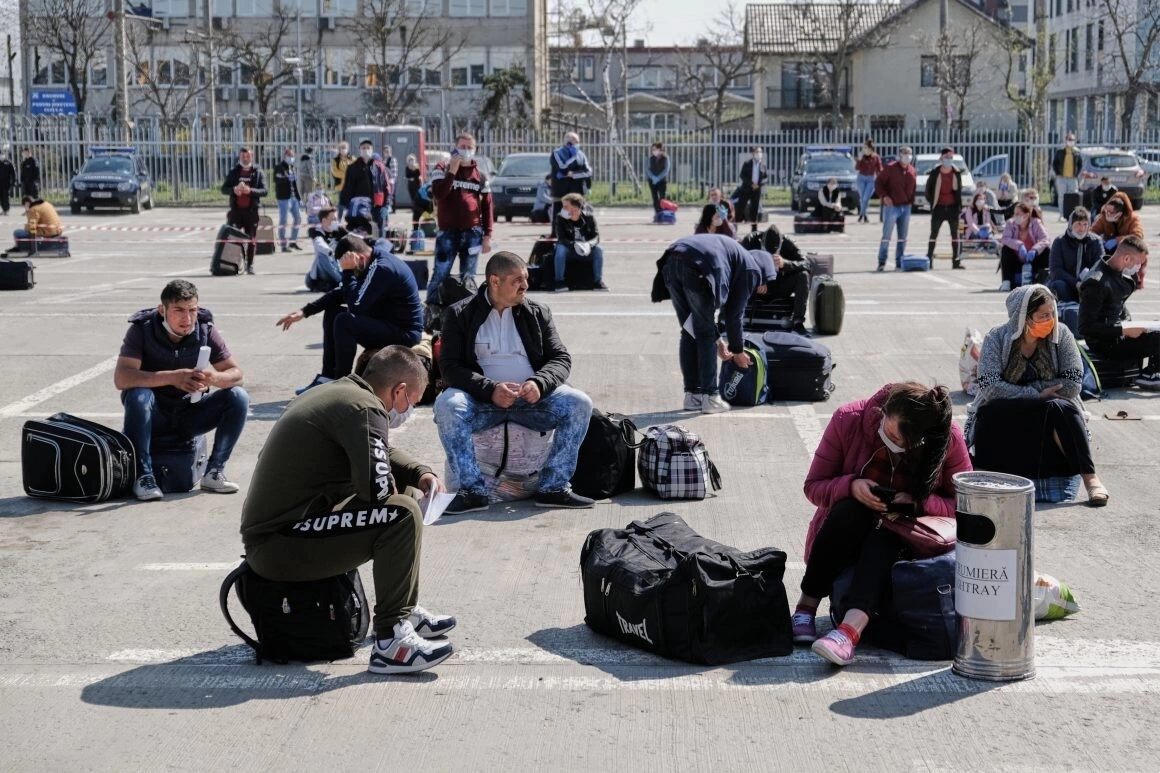
In a 2018 report on modern slavery, the GLAA found evidence of 15-hour shifts, sometimes 7 days a week, with pay below the national minimum, unreported accidents and poor housing conditions. The report reports that Romanians and Bulgarians are most at risk of exploitation.
Despite these findings, all the organisations we spoke to noted how difficult it is to get to talk to Eastern European seasonal workers, as they are afraid of putting their jobs at risk. Bev Clarkson from the UNITE union says: "We are the voice of the underrepresented and it’s our job to try and raise awareness to the plight of these workers who are being flown to help in this crisis but it is difficult when people are too frightened to talk to us. " Abuses are hard to report if workers don't want to report them. Paul Coffey of the GLAA says workers have a decision to make when they report abuse: "When you are faced with a choice...I managed to get to the UK, I managed to get some work, I am making more money than I made in Romania, I think I am probably being exploited. If we come along, or the police and we disrupt that, we see that as a success but the Romanian workers find themselves without a job. It’s really difficult to convince people to come forward and report exploitation. Most of them are thinking: if I do that then I'm not going to be working and I might have to go back home and then I'll be in the same position as before.”
Another problem is that most Romanians don't speak English and therefore don't always know their rights. The GLAA created a fake Facebook ad for jobs in agriculture in February, as part of an awareness campaign around exploitation. When people clicked on the fake link, trying to apply for jobs, they were sent to a page informing workers that the advert resembles one of an employer that would most likely exploit them. The page had over a million views. Since then, there has been an increase in reporting abuses, but the GLAA thinks exploitation is still underreported. Florina Tudose from the Eastern European Resource Centre in the UK says she's sure there is abuse in agriculture in the UK: "We've known very well for years, working with Eastern European workers, that exploitation exists in agriculture and modern slavery is a very common phenomenon in this field." However, the most common abuses, Florina believes, are small-scale, less obvious exploitation: "I hear stories like I work 60-70 hours a week, I can't do it anymore. They won't let me take a day off. Even though they get paid for overtime work, it's constant pressure; if you don't like it, you go home." The seasonal workers I spoke to are not sure what the contract says, whether they should be paid for breaks or transport between fields, how many breaks they are entitled to, how much time off they get.
"We are informing the government and workers that the pandemic is creating a climate that increases the risk of exploitation and slavery."
Paul Coffey, GLAA, the UK Labour Inspection Authority
General Secretary Kristjan Bragason of the European Federation of Food, Agriculture and Tourism Trade Unions (EFFAT) says he has also come across cases of workers being paid below the minimum wage in both England and Germany. Rent is another problem Bragason points out, because there is no legislation regulating how much can be deducted from workers' wages for housing costs.
Rules do exist in the UK, but Vicki Hird of the UK's Sustain farming alliance believes they are not enforced enough because of funding cuts in the sector. Emily Kenway of the NGO Focus on Labour Exploitation points out the same thing: "I would say we don't always know when abuses are happening because the rate of checks is low. Probably a lot of the problems are small-level abuses. But the pandemic is changing that. We're scared, because we have a lot of people in the UK who will be desperate for an income and will accept any conditions."
General Secretary of the European Federation of Food, Agriculture and Tourism Trade Unions (EFFAT) Kristjan Bragason is putting pressure on the European Commission to ensure that controls are carried out in agriculture and that coronavirus prevention measures are taken seriously. The response received at the beginning of the quarantine period from government representatives in Germany and the UK was that labor inspectors could not carry out checks because of quarantine, a huge contradiction: "We are concerned because we have heard of horrible cases, including in the UK, poor hygiene conditions, small containers, where social distancing cannot be respected," adds Bragason.
The Gangmasters and Labour Abuse Authority has since said it has restarted its labour inspections in agriculture, while maintaining social distancing rules. However, at the beginning of the quarantine period, the GLAA expedited the process of checking farms by issuing temporary licenses to ensure that supplies from stores didn't stagnate, but this break in protocol raises questions about the safety of seasonal workers. On the phone, Paul Coffey of the GLAA says: "We are informing the government and workers that the pandemic is creating a climate that increases the risk of exploitation and slavery. When you have an increase in supply-demand, when supermarkets ask producers to increase their production, but they don't have enough workers, what happens? When there is a shortage of labor, exploitation of existing labor occurs."
Agriculture is considered a high-risk sector for exploitation, because workers are dependent on employers for accommodation, transport to shops, labor. Seasonal workers are not part of unions, do not speak the language of the host country, and don’t have access to support from local communities, as they are living in isolation in rural areas. Workers come, work and leave. This dependence on the employer will increase significantly from January 2021, with the UK's exit from the European Union, when free movement will be restricted and seasonal workers' visas to the UK will be employer-dependent. While workers can now leave the farm and look for work in other cities because of their EU citizenship status, after Britain's exit from the EU, seasonal workers' visas will be dependent on the workplace and the fear of reporting abuse will be overshadowed by the fear of being out of work.
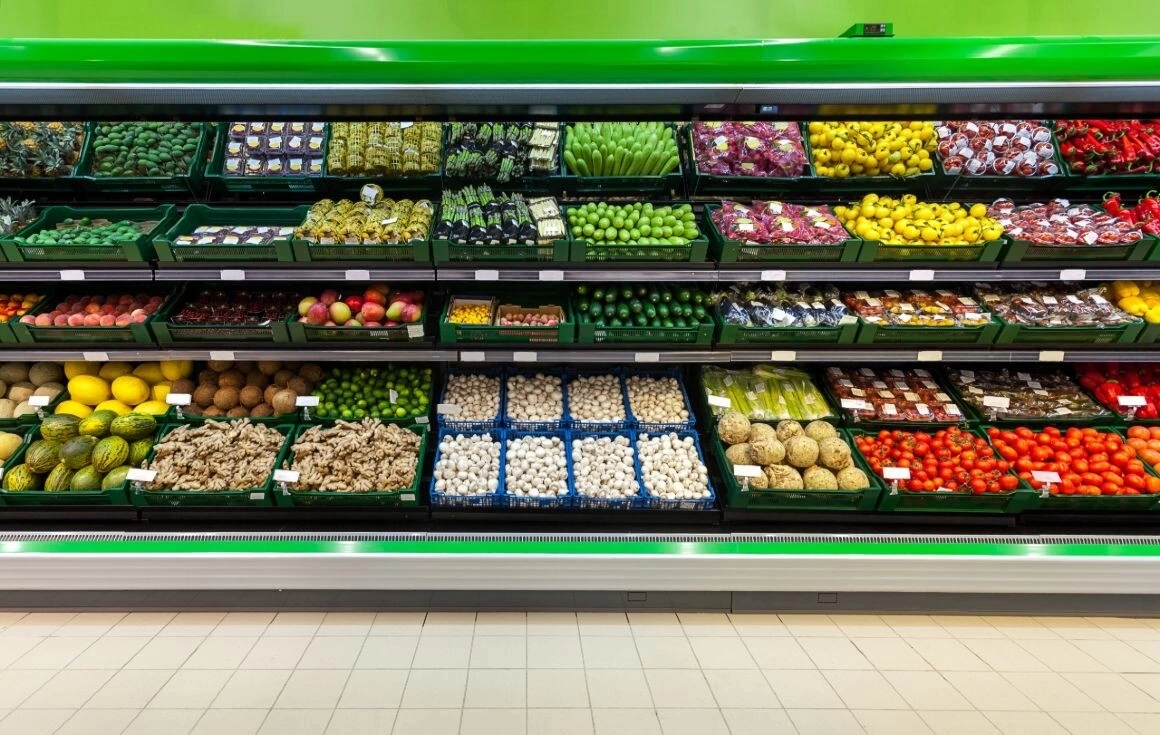
The cost of low prices
With Britain's exit from the European Union, the Conservatives promised fewer unskilled migrants to the UK. Asked in Parliament whether Britain had enough local labor for the hospitality industry and agriculture, Conservative Kevin Foster insisted that the new points-based immigration system would bring "the best and brightest immigrants to Britain" and that Britain's economy would no longer rely on "cheap labor from Europe." But the panic of the pandemic period shows how vital these workers are to UK agriculture. Martin Ward of the National Farmers Union of Great Britain (NFU) says farmers are worried they will no longer have access to Eastern European labor after Brexit.
"The low cost of food many times means exploitation of workers."
Kristjan Bragason, European Federation of Food, Agriculture and Tourism Trade Unions (EFFAT)
Farming in the UK is also constantly criticized for being unsustainable. All the British farming associations complain about the enormous power supermarkets have in the food supply chain. Consumers are used to finding the same fruit and vegetables on store shelves all year round (the just in time system) and the big chains impose rigorous standards (size, appearance) on food. In addition, supermarkets have control over the price they are willing to pay farmers, which is often below the cost of production. Because of this, farmers are under constant financial pressure to reduce the only costs over which they have control: the wages of seasonal workers and the conditions under which they work.
In extreme situations, farmers' panic - when faced with this economic model - results in abuse and exploitation. "The low cost of food many times means exploitation of workers," explains the general secretary of the European Federation of Food, Agriculture and Tourism Trade Unions (EFFAT) Kristjan Bragason. "The supply system is built on the promise of cheap labour, and if farmers can't find cheap local labor, they turn to workers from Eastern Europe, and if workers won't come from there either, even cheaper labor will be found from countries like Ukraine, Belarus, Thailand, the Philippines, China," Bragason continues. "In the EU there is talk of new directives on fair labor practices and more restrictions of the supermarket system and big food producers."
Vicki Hird of Sustain reminds us that the changes needed in the supply chain would not necessarily mean higher prices, but a simpler and more direct route to farmers so they can treat their farms and workers better. For now, on farming and the UK supply system she concludes, "Bad for the environment, bad for workers, bad for everyone."
*Two of the Romanian workers we spoke to chose to remain anonymous. Their names have been changed in the article.
Main photo: Romanian workers during quarantine, waiting at the Cluj Airport. By Raul Ștef / INQUAM Photos
